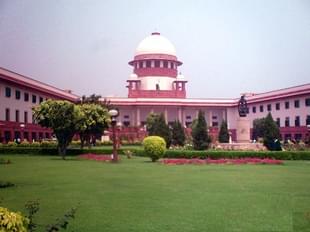Insta
Supreme Court Refuses To Stay Yeddyurappa’s Swearing-In, But Will Hear Congress Plea On Friday
Swarajya Staff
May 17, 2018, 10:05 AM | Updated 10:05 AM IST
Save & read from anywhere!
Bookmark stories for easy access on any device or the Swarajya app.


The Supreme Court late on Wednesday night refused to stay the swearing-in of a Bharatiya Janata Party (BJP) government led by B S Yeddyurappa in Karnataka following a fractured verdict. The court, however, said that the formation of the new government would be subject to the outcome of the petition filed by the Congress. The plea to stop Karnataka Governor Vajubhai Vala will be heard by the apex court tomorrow (Friday).
In the second midnight hearing in its history, the Supreme Court bench of Justices A K Sikri, S K Bobde and Ashok Bhushan asked the Attorney General K K Venugopal to produce the letters given by B S Yeddyurappa to the Governor. The hearing began at 1.45 am to full house in the court with Mukul Rohtagi appearing for the BJP and Additional Solicitor General Tushar Mehta for the Congress. Abhishek Singhvi appeared for the Congress.
PTI quoted Singhvi as telling the judges that the Governor invited Yeddyurappa in an unconstitutional manner when the BJP had only 104 MLAs and the Congress alliance, 116. He objected to the 15 days time given to the BJP to prove its majority and said the court can intervene and cut short the time given.
The judges feared that any restraint on the Governor would lead to constitutional vacuum in the state and the Supreme Court’s general trend was never to pass an injunction to the Governor or restrain him.
Rohtagi, defending the BJP, wondered why the petition was being heard at night. “Will heavens fall if a person is sworn in in the morning?” he asked. However, Justice Sikri asked him to prove how his side was claiming a majority.
Attorney General Venugopal asked the court that in the event of the decision being reversibile, “what is the great loss by waiting for 15 days?” However, Justice Bobde quipped: “Why wait for 15 days?”
Rohtagi said the court could cut the time given but not pass any injunction on the Governor. No one represented Yeddyurappa, who was the third respondent in the petition. Finally, the court decided that it wouldn’t intervene and would subject it to the outcome of the Congress petition.
Karnataka went to elections on 12 May and results were declared on 15 May. The results saw no party getting majority but the BJP emerging as the single largest party with 104 seats. The Congress ended up winning 78 seas and the Janata Dal (Secular) or JD(S), 37. Among the parties that contested the polls, only the JD(S) and Bahujan Samaj Party had a pre-election alliance. The Congress, in an effort to prevent the BJP from taking over the state’s rein, entered into a post-poll alliance offering JD(S) leader H D Kumaraswamy, the chief ministership. The alliance claimed the support of 117 legislative members.
While the BJP and Congress-JD(S) alliance staked claim to form the government, the Governor invited the BJP as it had emerged the single largest party and gave it 15 days time to prove its majority on the floor of the assembly. Following this, the Congress chose to petition the Supreme Court.





